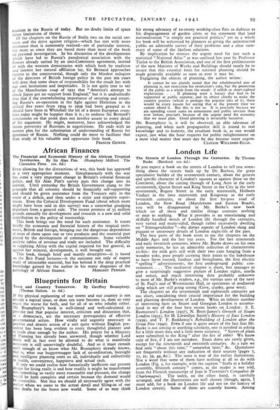Blueprints for Britain
Town and Country Tomorrow. By Geoffrey Boumphrey. (Thomas Nelson. as. 6d.) IF the physical replanning of our towns and our country is not already a topical issue, or does not soon become so, then so very much the worse for both, and for all of us who inhabit either. Mr. Boumphrey's book is well-timed and well-calculated to provoke just that popular interest, criticism and discussion that, in a democracy, are the necessary prerequisites of effective governmental action. How vitally and urgently necessary is Positive and drastic action of a sort quite without English pre- cedent has been long evident to every thoughtful planner and is made clear enough by the author. His prayer for a Ministry of Planning has already been answered, though whether Lord Reith will in fact ever be allowed to do what is manifestly necessary is still unnervingly doubtful. And so it must remain til enough of us know what Mr. Boumphrey already knows, that is, what our huggermugger lack of co-ordination, foresight and intelligent planning costs us all, individually and collectively in health, convenience, happiness and actual cash.
II only we could realise how fantastically inefficient our present esign for living really is and how readily it might be transformed 'Ito something so vastly more reasonable and pleasant, the change 'oi?ld be both complete and certain because the demand would irresistible. Not that we 'should all necessarily agree with the uthor when we come to the actual detail and filling-in of our wn drafts for the brave new world. Some of us may think his strong advocacy of to-storey working-class flats as dubious as his disparagement of garden cities or his statement that land nationalisation "is simply not practical politics," yet as a whole his book will be welcomed by planners is giving the uninstructed public an admirable survey of their problems and a clear sum- mary of some of the likeliest solutions.
By implication he stresses the urgent need for just such a statistical "National Atlas" as was outlined last year by Professor Taylor to the British Association, and one of the first preliminaries of the new Ministry of Works and Buildings should surely be to insure that this essential basis for national planning should be made generally available so soon as ever it may be.
Explaining the objects of planning, the author writes : It cannot be too plainly stated that the wholehearted aim of
planning is, not restriction for restriction's sake, but the protection of the public as a whole from the result )f selfish or short-sighted exploitation. . . If planning were a luxury that had to be supported at public expense, and its object chiefly to make the country prettier (which is perhaps the popular idea of it), there would be every reason for saying that at the present time we cannot afford it. But this is not so. It is precisely because we are spending vaster sums on armaments and public services than ever before, precisely because of the urgent need for economy that we must plan. Good planning is invariably lucrative.
Mr. Boumphrey is, it will be observed, an able salesman of planning, and when such propagandist skill is joined to real knowledge and to honesty, the resultant book is, as one would expect, just what the hour requires for public enlightenment on a most vital matter that must day by day become more urgent.
SLOUGH W1LLIAMS-ELLIS.






























 Previous page
Previous page